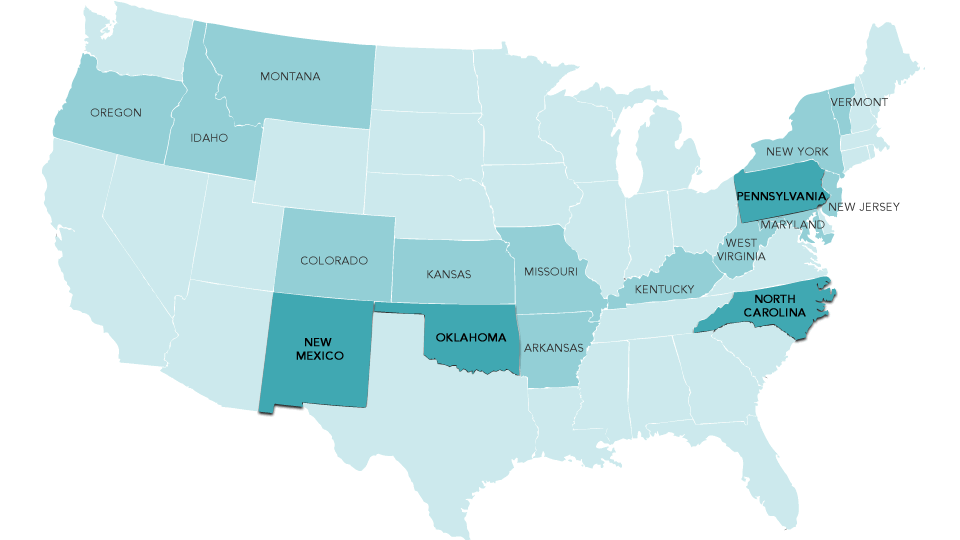
Lead State: North Carolina
North Carolina Healthcare Quality Alliance (NCHQA), initially established by the Governor’s office in April 2008 and now operating as an independent non-profit organization, is a collaboration of NC’s physicians, hospitals, insurers, and other stakeholders working toward the goal of improved quality of care for all patients, regardless of payer. NCHQA aims to provide unified leadership of providers, payers and consumers in NC to improve health and health care for all North Carolinians.
In 1998, the State Office of Rural Health (an office within the NC Department of Health and Human Services) developed (in concert with the Division of Medical Assistance and the NC Foundation for Advanced Health Programs, Inc.) the Community Care of North Carolina (CCNC) program. CCNC built upon North Carolina’s Primary Care Case Management Program, Carolina Access, by working with community providers to better manage the state’s enrolled Medicaid population through the medical home model. Since that time, Medicaid has provided practices and regional networks of practices and hospitals with per member per month (PMPM) payments to serve as medical homes and improve the quality of care provided to this vulnerable population. CCNC has spread across the entire state and now has 14 distinct independent provider networks with 2000 practices. The program has achieved HEDIS™ scores for diabetes, asthma, and heart disease in the top ten percent nationally, while saving the Medicaid program nearly a billion over a four-year span.
Currently, CCNC is expanding their services beyond Medicaid enrollees. NC received a Section 646 waiver that has expanded CCNC’s reach to include dually eligible (Medicare and Medicaid) beneficiaries and will eventually cover all Medicare patients for one-third of the state. NC was also awarded a Multi-Payer Advanced Primary Care Practice demonstration project from the Centers for Medicare and Medicaid Services. Under this demonstration, certain CCNC networks will coordinate the care and improvement for patients covered by Medicaid, Medicare, BCBSNC, and State Health Plan (which together represent ~80% of covered lives).
In addition to CCNC’s success creating highly effective networks of practices, reforming payment structures, and designing better care, the NC Area Health Education Centers Program (NCAHEC) has become a full partner in assisting practice transformation efforts. The NCAHEC, established in 1972, is the largest regional health professions network of its kind in the country with a full-time faculty and staff of over 1000. Modeled after the agricultural extension concept, NCAHEC works in association with the state’s four academic medical centers, universities, and community colleges to establish community-based training programs for health professions students and medical residents. NCAHEC’s 20 primary care residency programs have trained over 2900 physicians in the past 25 years.
Over the past 12 years, the NCAHEC has enhanced and emphasized education programs focused on performance improvement activities over traditional continuing education. This activity has included facilitating several large-scale improvement programs, training clinicians and practice coaches (e.g., Quality Improvement 101 course ), and now a large scale practice coaching and improvement network program that is part of the overall NC strategy for statewide practice support—working with more than 1,100 practices and over 3,800 providers in the state so far. The NCAHEC became the operations arm of the NC Improving Performance in Practice (IPIP) program which provides collaborative learning opportunities combined with on-site practice coaching to assist practices that desire intensive transformation. In addition to the IPIP program, the NCAHEC was selected by ONC as the Regional Extension Center (REC) for NC to assist primary care practices in implementing electronic health records (EHRs). These efforts are all coordinated with CCNC networks and have led to an extremely effective structure for supporting primary care practices. We believe this model is an exemplar for how a primary care extension program can work.

Land Area: 48,618 square miles
Population: 9,752,073
Persons per square mile: 196.1
Median household: $46,291
Below poverty level: 16.1%
Collaborators within North Carolina
Darren DeWalt (PI)
University of North Carolina Sheps Center for Health Services Research & UNC School of Medicine
Email: Darren_DeWalt@med.unc.edu
Laura Brown
North Carolina Area Health Education Centers
Email: LauraBrown@med.unc.edu
Jennifer Cockerham
Community Care of North Carolina
Email: JCockerham@n3cn.org
Sam Cykert
North Carolina Area Health Education Centers
Email: Samuel_Cykert@med.unc.edu
Find out more about the states participating in health extension around the country:
 Lead States (funded through AHRQ IMPaCT grants)
Lead States (funded through AHRQ IMPaCT grants)
 Learning Community Participants
Learning Community Participants





